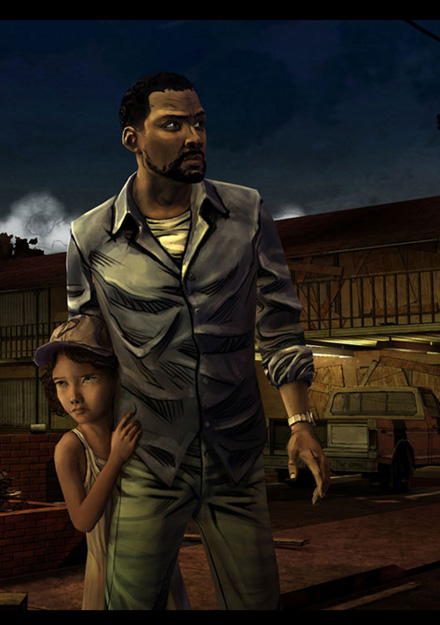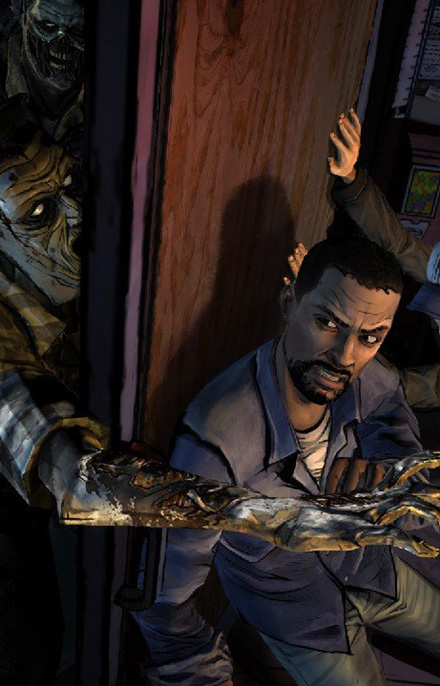As I have thought about this review, I have gone back and forth thinking about its length. I feel like I could write a million words about Telltale Games’ The Walking Dead, but at the same time feel like it needs only three: It is amazing. Amazing not for its graphics or gameplay, but with its ability to engage, to draw real emotion. It is a feat that a lot of games attempt, but ultimately fail, and it is the reason why you should play this game if at all possible.

The Story Begins
Like many other Telltale titles, The Walking Dead is broken up into five “episodes” with mini story arcs and cliffhangers. The challenge for me, right now, is attempting to tell you about this story while not giving anything away. Interesting things happen from the beginning of this game to end, and I don’t want to spoil any of it. As a result, I will be as general as possible: you play as Lee, you meet an incredibly tough eight year old named Clementine, and Atlanta just became home to the undead. Beyond that, you need to experience everything fresh for yourself because having anything spoiled would be TERRIBLE.
Working As A Group
Lee and Clementine eventually come to find a group of other survivors, and the interactions among this group make up the majority of the gameplay. You will mostly be doing one of two things while playing The Walking Dead: talking to people and making quick decisions based on the information you are given. Unlike a lot Point & Click adventure games, your inventory takes a back seat to the story. You will not be spending much time trying to use every item you have on every point of interest in the room to try and find something that works. You will definitely get items and solve puzzles with them, but they generally make sense. Instead, you will be speaking with characters and providing dialogue within a time limit. You almost never have the option to wait and carefully think about what you want to say; like a real conversation, you will choose to say the thing that makes the best sense in the moment. Interestingly, silence is an option, and sometimes it is best to not throw your voice in.
Your interactions with characters carry over through episodes of the game, and something you might say to a character or a decision that you make that affects them may come back to haunt you later on. The game lets you know when a NPC has taken what you have done to heart with messages that pop up saying, “______ will remember you said that.” This simple mechanic not only can change the dialogue of characters later on, but it also keeps you abreast of how you are affecting them. Where once you might think it is a good idea to tell off a character for their actions, later on you might need them to be on your side and they won’t be. Every step of the way you are attempting to balance your relationships with people in a world where folks can be friends one instant and traitors the next.

The Lesser Of Two Evils
Relationships that you have attempted to cultivate over the course of several episodes can be shattered in an instant by a roving band of zombies or any other threat to survival. Your character, Lee, can generally move freely about the location you are in, but when the action starts, you generally have a limited amount af time – like in dialogue – to choose what is best for that moment. This does include life or death situations, and it is TOUGH.
It’s not tough because you are choosing 1 or 2, or this or that, but because Telltale did such an excellent job of bringing the characters to life that you don’t want to choose. It’s not fair that you have to choose another person’s fate, but in this world where that has suddenly become a normal fact of life, you have to, and it totally sucks in the most amazing way. I feel like I have been around the video game block a few times and seen many a thing, so my reactions to onscreen, digital humans don’t always elicit much reaction from me. I’ve seen a million digital characters get shot or do horrific things. But The Walking Dead was able to break through some desensitized wall I had built, and I truly loved and hated characters in this game. There were instances where I was shouting at the screen because a character betrayed me or was about to do something stupid. Even though what was happening wasn’t even to me but to Lee, I took it personal. “Why are you doing this?!” I’d say in frustration to a character who I (Lee) had helped so many times but then stabs me (Lee) in the back.
A really cool feature that Telltale includes is that if you are connected to the internet, some of the choices that you make are polled in the background, and at the end of the chapter you can see what everyone who has played the game chose. You gather some interesting insights when a poll for a decision is heavily skewed.
They Aren’t Bad People
The most interesting thing, though, and what helps bring out emotions that make me shout at a screen, is that I felt like almost none of the characters were bad people. Everyone is simply in a terrible situation, and they are trying to deal with it the best way that they can given the circumstances. So when our group’s supplies are lower than expected, and someone is obviously pocketing a little more than the rest, I hate them and sympathize with them at the same time. Nothing is black and white for anyone anymore, and Telltale expertly uses that to pull you in and not let go.
Buy This Game
The Walking Dead can be found in myriad locations for purchase. It is on PC/Mac, iOS, PS3, and Xbox 360. Surely, you have one of these somewhere (and as someone who played it on a 2006 2nd gen MacBook Pro, it’ll run on older hardware, the specs be damned). It’s a title that’s not to be missed.
And FYI: very soon, 400 Days, a DLC episode to “season 1” of The Walking Dead. It doesn’t follow the characters in season 1 specifically, but choices you make in season 1 will have repercussions in 400 Days, and likewise, choices you make in 400 Days will change some things in season 2.